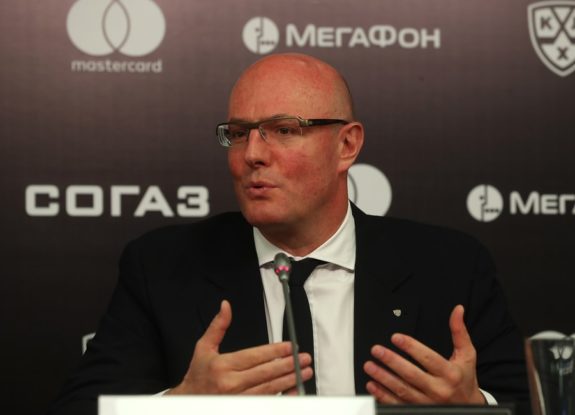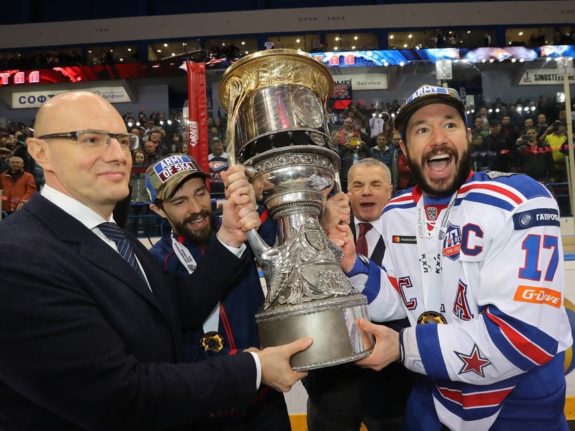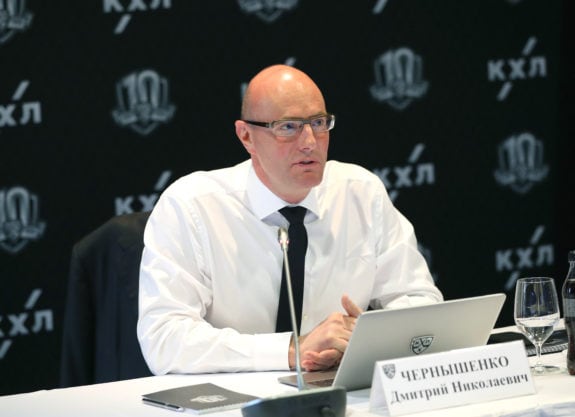The idea of games pitting the NHL against the Kontinental Hockey League will always generate fan interest. Contrary to popular belief, the two leagues aren’t actually direct competitors, though. In the hockey world, there’s more than enough room for both.
KHL vs. NHL?
Granted, speculation over potential meetings between teams from the respective leagues has ramped up recently with the NHL reaching an agreement to broadcast games in Russia. From KHL president Dmitry Chernyshenko’s perspective, it simply boils down to logistics.
“When the NHL finishes [the Stanley Cup Final], our players have already been [done their season] for one and a half months,” said Chernyshenko in a candid meeting from one of the KHL’s multiple office spaces in Moscow.

“When [NHL players] finish, KHL players are coming back to start the preseason [in July/ August]. The only opportunity that we really see is that instead of all-star games in the middle of January we organize something. It’s a problem with the calendar, nothing else. We would love it.”
Nevertheless, it would just be one theoretical game in a packed calendar. The KHL has its own schedule, its own market, and its own rabid fanbase. Any argument hypothesizing the KHL is chasing the NHL’s level of success directly contradicts the obvious: The NHL has its fans, but it fights tooth and nail to stay in the conversation as one of the top four major sports leagues in the States.
In sharp contrast, in Russia, hockey and the KHL by association are in little danger of fading away. Admittedly still second to soccer in terms of popularity, hockey is nevertheless so engrained in the culture that there is always going to be an appetite for it, ranking probably somewhere between vodka and caviar.
“Russia is a hockey country,” Chernyshenko said proudly. “It’s in our blood.”
KHL in Firm Control of Situation
In fact, it can be argued the NHL has an inherent marketing problem, with some work to do embracing analytics, among other issues. Even though they’ve taken steps to implement puck and player-tracking technology, the KHL is in the process of perfecting it. This season, the KHL became the first league to deploy an automated platform and make available to its clubs all the real-time data tracked therein, including puck and player speeds and shift-specific statistics.
The possibilities are endless from a fan perspective and that of the league itself, monetarily speaking. Sportsbooks looking to take advantage of prop betting on who had the hardest shot in a game or which player reached the fastest speed? Just one of several huge revenue streams in the making.

Admittedly, the NHL gaining broadcast rights in Russia can be seen as a major coup, but not necessarily an infringement on KHL territory. It’s akin to the Swedish Hockey League hypothetically looking to increase its exposure in Finland. There will always be fans, many concentrated close to the border, but they’re two different cultures in countries with a historic rivalry. Patently absurd.
Now take that border and place an entire continent and ocean between the two countries. Add in seven time zones (at least) and NHL games that broadcast in the dead of night for good measure. Put simply, the obstacles in front of the NHL entering Russia are greater than those that the NHL in Russia pose for the KHL.
The theory is simple: the KHL need not worry… on multiple fronts. Not only is it a misconception that the KHL is purely Russian—it has teams spanning six countries—but the league broadcasts in 34 countries itself, increasing its profit margin in each of the seasons Chernyshenko has been at the helm, after finishing in the red under predecessor Alexander Medvedev.
So, the NHL adding a single country to its stable is a veritable drop in the bucket. It certainly won’t hurt the NHL, but it likely won’t hurt the KHL either; It might simply reinvigorate its efforts to up its game. And that’s saying a lot. Those efforts are already in full force.
The KHL Gets a Salary Cap
Indeed, the KHL has found renewed stability under Chernyshenko dating back to the start of his tenure as president in 2014. Almost as if he were an NHL general manager with a five-year plan for success, the KHL will introduce a hard salary cap for 2020-2021, after his fifth complete season on the job. This after member clubs were given time to transition, from the point at which he came on. Then they had a cap too, but an excessively high, fiscally irresponsible one, though. Since then, there’s been an ever-decreasing soft cap paired with a luxury tax.
The projected ₽900 million (~$14 million) new hard cap is 30% lower than what it had been before Chernyshenko started (ignoring the volatile exchange rate). It’s a big difference, with the NHL’s increasing by just over a quarter from the same starting point up to now. It’s a different situation, though. The lower KHL cap is projected to help increase parity across the league when at one point there had been a payroll difference of a factor of eight between the richest and poorest KHL teams.

So, obviously the KHL has its problems, but it acknowledges and is getting a handle on them. The league also acknowledges the NHL for what it is: a different product and brand, one that’s undeniably great, just not a competitor, though. If the two were to ever meet, it would be about the grand spectacle of it all… not the outcome. Everyone wins there.
“The KHL is a growing product, while the NHL has a structure that has historically worked well for a long period of time,” said Chernyshenko, arguing the two brands are not meant to be compared to one another.
“We’re not trying to copy the NHL. Rather, we want to make a good league with exclusive features that could increase the popularity of hockey in Russia and other Asian and European countries. Overall, both leagues are promoting ice hockey as a sport loved by millions of fans all over the world.”
Make sure to check out the other articles from my Russian experience:
The Story of My Russian KHL Odyssey
Top 5 KHL Misconceptions and Myths